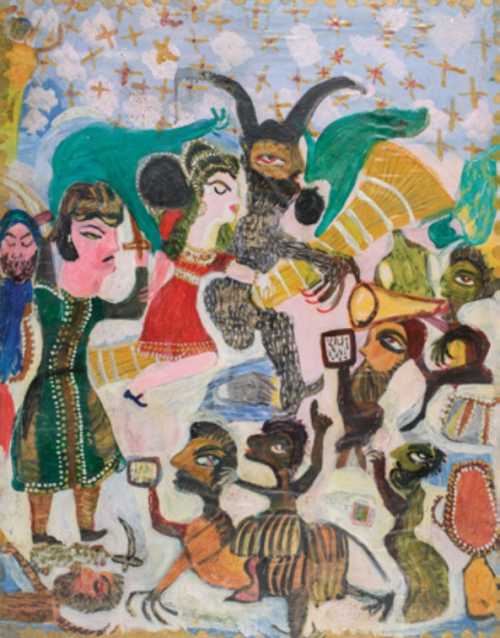About Mokarrameh Ghanbari
Mokarrameh Ghanbari, renowned as Iran's most celebrated self-taught painter, was born in the village of Darikandeh in Babol city. She reminisced that her innate passion for creating designs and images emerged during her childhood, often expressed through playing with mud and dirt. This innate desire persisted, evolving into hairdressing, particularly bridal makeup for village weddings. Beginning work at the age of 10, she navigated through life's challenges until the age of 67. Alongside raising nine children, she worked variously as a tailor, hairdresser, midwife, and local healer. However, an incident transformed her inner zeal into an external expression.
When Mokarrameh's beloved cow fell ill and her children, concerned for her well-being, sold the animal without informing her, she was left deeply saddened. Turning to painting as a means of coping, despite her inability to read or write and lacking formal training, she created remarkable artwork. Her inaugural piece was a portrait of her cow, crafted with mud and dirt on stone. Subsequently, she adorned her home's walls, doors, and any available surface with her designs until one of her sons, visiting monthly from Tehran, provided her with paint and paper. From then until her passing, Mokarrameh painted ceaselessly, her entire home adorned with paintings, each narrating poignant tales from her life, including her journey chronicled in the Quran, her trials, her steadfast defiance, and her forced marriage at a young age.
In an interview with Mrs. Holly, an American filmmaker who documented her life, Mokarrameh revealed, "For four years, I painted alone at night, hastily hiding my creations whenever unexpected guests arrived...because they believed a farmer had no use for paper, paint, or pen. I was always occupied, working at home and painting. I've never been idle, not even napping like other women in the afternoon."
Mokarrameh's artistic journey began with her debut exhibition at Seyhoun Gallery in 1995. This marked the commencement of a series of annual showcases at the same venue. Subsequently, in 2001, she was honored as Sweden's Female Painter of the Year, signifying her growing international recognition. Her works reached an even broader audience with an exhibition held in Los Angeles in 2004. After that she received special recognition at the Roshd film festival. Tragically, in September 2005, Mokarrameh Ghanbari passed away, leaving behind a legacy that continues to inspire artists and admirers worldwide.
The Most Expensive Artwork
At Auctions
First Attendance
11 January 2019
# Attendance
5
# Artworks
5
Average Realized Price
2,866 USD
Average Min Estimate
2,338 USD
Average Max Estimate
3,144 USD
Sell-through Rate
100%
Average Growth of Artwork Worth
5.921%
Timeline
Resize exhibition
16 August
The 20th Tehran- Modern and Contemporary Iranian Art auction
5 July
The Artwork of Legendary Artists exhibition
9 February
Modern Collectore exhibition
19 January
A Glimpse Of Outsiderinn exhibition
11 August
Recovery/ The third series exhibition
10 March
Mokarameh Ghanbari's Artworks exhibition
22 July
Tehran- 16th- Iranian contemporary art auction
1 July
Nowruz Festival of Rivers exhibition
10 March
The 8th Annual Outsider Art Exhibition exhibition
18 February
8th Collector exhibition
9 July
Small Artworks collection exhibition
11 June
The 7th Annual Outsider Art Exhibition exhibition
5 February
No.4 auction
9 June
دوازدهمین دوره حراج تهران auction
17 January
Mokarrameh exhibition
12 April
دهمین دوره حراج تهران auction
11 January
The Winter Experience exhibition
10 June
